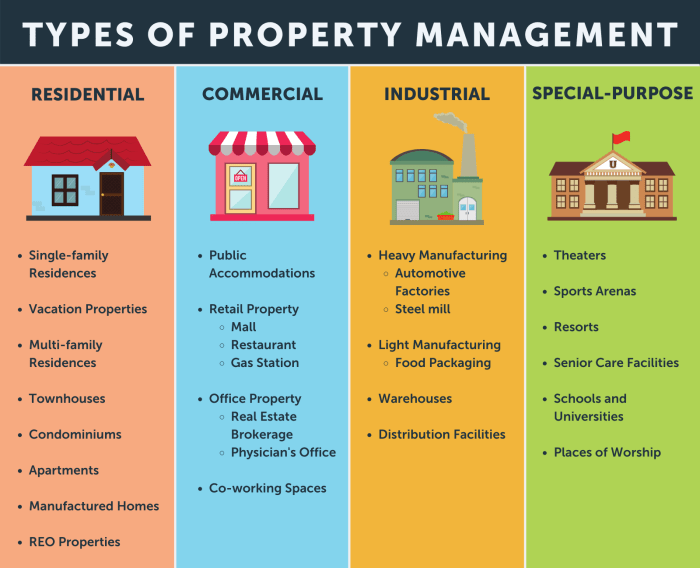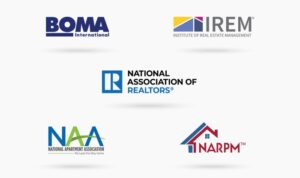Delving into real estate property management, this introduction immerses readers in a unique and compelling narrative. From the advantages of professional property management services to the responsibilities of property managers, this topic covers a wide array of crucial aspects in the real estate industry.
As we delve deeper into the world of real estate property management, readers will gain valuable insights into tenant selection strategies, property maintenance, and more, all presented in a clear and engaging manner.
Benefits of Real Estate Property Management
Professional property management services offer numerous benefits for property owners, helping them maximize their rental income and maintain the value of their investments. Here are some advantages of utilizing property management services:
Increased Rental Income
- Property managers have the expertise to set the right rental rates based on market trends and property condition, ensuring that owners are not underpricing their units.
- They can also implement effective marketing strategies to attract quality tenants quickly, reducing vacancies and maximizing rental income.
- Regular property inspections and maintenance by property managers can help maintain the property's appeal, allowing owners to justify higher rental rates.
Tenant Relations and Property Maintenance
- Property managers act as the main point of contact for tenants, handling all communication and addressing any issues promptly to ensure tenant satisfaction.
- They enforce lease agreements and property rules, reducing conflicts between tenants and protecting the owner's interests.
- Property managers oversee routine maintenance and repairs, coordinating with reliable vendors to ensure the property is well-maintained and attractive to tenants.
Responsibilities of Real Estate Property Managers

Real estate property managers play a crucial role in ensuring the smooth operation and maintenance of properties on behalf of the property owners. They are responsible for a wide range of tasks that are vital for the success of any real estate investment.
Day-to-Day Property Management Tasks
- Handling tenant inquiries, requests, and concerns.
- Advertising vacancies and showing properties to potential tenants.
- Screening and selecting suitable tenants through background checks.
- Collecting rent payments and enforcing lease agreements.
- Coordinating maintenance and repairs as needed.
- Conducting regular property inspections to ensure compliance with safety and maintenance standards.
Importance of Financial Management
Financial management is a critical aspect of real estate property management as it involves handling the budget, expenses, and revenue associated with the property. Effective financial management ensures that the property remains profitable and sustainable in the long run.
Proper financial management includes budgeting, rent collection, expense tracking, and financial reporting to property owners.
Legal Compliance and Risk Management
- Ensuring compliance with local, state, and federal housing laws and regulations.
- Handling evictions and legal disputes with tenants in accordance with the law.
- Managing insurance policies to mitigate risks and liabilities associated with the property.
- Keeping up-to-date with changing laws and regulations to avoid legal issues and penalties.
Tenant Selection and Retention Strategies
Effective tenant screening processes are crucial for property managers to ensure they select reliable tenants who will pay rent on time and take care of the property. This typically involves checking credit scores, rental history, and criminal background checks to assess the potential tenant's ability to meet their obligations.
Maintaining Good Tenant Relations
Building positive relationships with tenants is key to reducing turnover and ensuring tenant satisfaction. Property managers can achieve this by responding promptly to maintenance requests, addressing concerns in a timely manner, and showing appreciation for good tenants through gestures like holiday cards or small gifts.
- Communicate clearly and consistently with tenants to set expectations and maintain transparency.
- Offer incentives for lease renewals, such as a discount on rent or a small upgrade to the rental unit.
- Provide a well-maintained property and ensure a safe and comfortable living environment.
Handling Lease Agreements and Rental Renewals
Property managers are responsible for drafting lease agreements that Artikel the terms and conditions of the rental, including rent amount, due date, and rules for the property. When it comes time for lease renewals, property managers can proactively reach out to tenants to discuss renewal options and negotiate any changes to the lease terms.
- Review lease agreements with tenants to ensure they understand their responsibilities and rights.
- Monitor lease expiration dates and initiate discussions with tenants well in advance to secure renewals.
- Negotiate rental increases or changes to lease terms based on market conditions and tenant preferences.
Property Maintenance and Inspections
Property maintenance and inspections play a crucial role in the overall management of real estate properties. It is the responsibility of property managers to ensure that regular maintenance and repairs are carried out to preserve the value of the property and provide a safe and comfortable living environment for tenants.
Role of Property Managers in Ensuring Regular Maintenance and Repairs
Property managers are tasked with overseeing the maintenance and repair needs of the properties under their management. This includes coordinating with maintenance personnel, contractors, and vendors to address any issues that may arise. Regular maintenance tasks such as landscaping, HVAC system checks, and building repairs are essential to prevent costly damages and maintain the property's overall appeal.
Process of Conducting Property Inspections and Addressing Maintenance Issues
- Property managers conduct regular inspections to identify any maintenance issues or potential problems that need to be addressed.
- Upon identifying maintenance issues, property managers prioritize and schedule repairs accordingly to prevent further damage.
- Property managers coordinate with maintenance personnel or contractors to ensure timely and efficient resolution of maintenance issues.
Importance of Proactive Maintenance in Preserving Property Value
Proactive maintenance is essential in preserving the value of a property and ensuring tenant satisfaction. By addressing maintenance issues promptly and conducting regular inspections, property managers can prevent small problems from escalating into larger, more costly repairs. This not only helps to maintain the property's value but also contributes to the overall tenant experience and satisfaction.
End of Discussion
In conclusion, real estate property management plays a vital role in maximizing rental income, maintaining tenant relationships, and preserving property value. By understanding the intricacies of property management, individuals can navigate the real estate market with confidence and efficiency.
Answers to Common Questions
What are some common benefits of professional property management services?
Professional property management services can help landlords save time, increase rental income, and ensure that properties are well-maintained through experienced oversight.
How do property managers handle tenant relations?
Property managers handle tenant relations by addressing tenant concerns, enforcing lease agreements, and ensuring a smooth communication process between tenants and landlords.
What is the significance of financial management in real estate property management?
Financial management in real estate property management involves budgeting, rent collection, and financial reporting to maintain the financial health of the property and maximize profitability.
How do property managers conduct property inspections?
Property managers conduct regular property inspections to identify maintenance issues, ensure compliance with safety regulations, and address any concerns before they escalate.
What are some effective tenant screening processes used by property managers?
Effective tenant screening processes typically include background checks, credit checks, employment verification, and rental history review to find reliable tenants.






